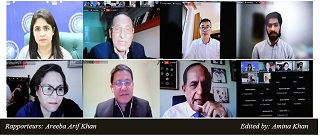The Centre for Afghanistan, Middle East & Africa (CAMEA) at the Institute of Strategic Studies Islamabad (ISSI) held a Panel Discussion on ‘Conversations on the Evolving Situation in Afghanistan: China’s Role in Afghanistan’ which is the eighth in a series of conversations CAMEA will be having on Afghanistan – under its Conversations on the Afghan Peace Process series.
The distinguished speakers included: Ambassador Naghmana Hashmi, Pakistan’s former Ambassador to China, Mr. Wang Shida, Deputy Director, Institute of South Asian Studies, China Institutes of Contemporary International Relations (CICIR), Dr. Haiyun Ma, Associate Professor, Frostburg State University, Dr. Haroun Rahimi, Assistant Professor of Law at the American University of Afghanistan. Ambassador Aizaz Ahmad Chaudhry, Director General ISSI also participated in the discussion.
During her opening remarks, Ms. Amina Khan, Director CAMEA stated that the situation in Afghanistan has drastically changed with the Taliban takeover and US withdrawal. While the Taliban have established an interim government, the real test for the Taliban has only just begun – which is certainly not limited to the capture of power, but is more about legitimacy, recognition, acceptance, and performance. Even within the confines of the current Taliban dominated set up, a lot will depend on whether the Taliban can deliver – in terms of governance, foreign relations, human rights and more importantly CT assurances. Regional countries have come to the forefront to play a more prominent role in Afghanistan and one such country is China. Since 2014, China has moved away from its limited role, to a more proactive one by not only supporting but also facilitating the Afghan Peace process by being a part of a number of trilateral and multilateral initiatives. Beijing’s growing tilt towards Afghanistan can also be attributed to political, security and economic interests, primarily concerns regarding the fear of transnational terrorist groups such as ETIM as well as challenges to connectivity projects such as the CPEC.












